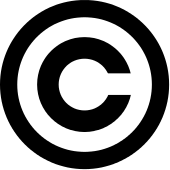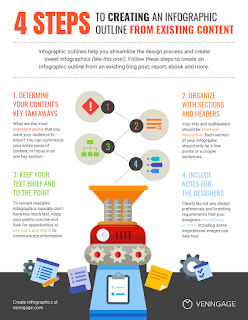Copyrights and You
Today's post is all about copyrights and education; a subject that has the majority of teachers confused, frustrated and targets for copyright lawyers. So what is a copyright? John Finch --a copyright coordinator-- came in and explained it.
According to Finch "if you create it you own it." For example if you create a song, it is both legally and morally yours until it enters the public domain 50 years (soon to be 75 years) after you die. Now how does that translate into education? One example, when a student in your class creates a piece of any kind you need their permission and parent/guardian permission to post it. Now students do give up their rights with in the classroom like posting their work within the private environment of the classroom, but technically, a teacher needs student permission to post their creations in a public environment, whether that is in the hall outside the classroom or on your class website (thankfully most parents give permission to share students work within reason, however one needs to respect their wishes if they reserve the permission too).
The "Fair Dealing" policy outlines the rules and restrictions of copyrights as the users rights. Prior to 2012 "Fair Dealings" policy allowed peoples to copy copyrighted works without permission from the creator if it was used for research, criticism, review, private study or news reporting with six conditions:
Now this isn't just making photocopies, this also includes movies and music played in class for entertainment purposes. Therefore, it is important to attain the proper permits when using media outside of educational purposes that benefit the student. Both Socan and Resound licences are required for facilities to use music in a public setting. There are also other companies that require school divisions and facilities to pay a fee for the rights to show/use media without infringing on copyright laws. However, be aware of Technological Protective Measures or Digital Locks. These are media sites that require a username and password which are intended for private use. To be safe avoid sites that are password protected like Spotify and Netflix in the classroom.
Finch used a Maria Aragon's cover of Lady Gaga's Born this Way. The video went viral and has received over 100 million likes. So is this video infringing on Lady Gaga's copyrights? Take a listen
The answer is yes. Miss Aragon is singing Lady Gagas creation without her permission. Technically she has broken copyright laws. Now Finch shared with us that in this case Lady Gaga had to choices: sue this girl for everything she had or in this case she flew Miss Aragon to her concert in Toronto to sing with her live in concert. Warning this is not always the case. For example while Steven Harper was running for re-election in 2015 he collaborated with Miss Aragon covering John Lennon's song "Imagine". You may not remember this because the cover was removed from YouTube a week later due to copyrights held by Lennon's widow.
On more of a side note Finch also shared an interesting Ted Talk discussing how YouTube is dealing with Copyrights.
For the most part I agree with the copyright rules and understand that it is for the protection of the creators, but man do you ever need to be careful if you don't want to have a conversation with your superintendent asking why they are being sued over a textbook as an example. It's also an important topic to bring up with students and help them understand and abide by copyrights. Downloading music and movies illegally can really harm the industry.
According to Finch "if you create it you own it." For example if you create a song, it is both legally and morally yours until it enters the public domain 50 years (soon to be 75 years) after you die. Now how does that translate into education? One example, when a student in your class creates a piece of any kind you need their permission and parent/guardian permission to post it. Now students do give up their rights with in the classroom like posting their work within the private environment of the classroom, but technically, a teacher needs student permission to post their creations in a public environment, whether that is in the hall outside the classroom or on your class website (thankfully most parents give permission to share students work within reason, however one needs to respect their wishes if they reserve the permission too).
The "Fair Dealing" policy outlines the rules and restrictions of copyrights as the users rights. Prior to 2012 "Fair Dealings" policy allowed peoples to copy copyrighted works without permission from the creator if it was used for research, criticism, review, private study or news reporting with six conditions:
- Purpose of the dealing
- Character of the dealing
- Amount of the dealing
- Alternatives to the dealing
- Nature of the work
- Effect of the dealing of the work
Until 2012, this did not include education. Therefore it meant that teachers needed to get/buy permission to copy pieces for student use. However, the Canadian government changed the Fair Dealing policy to include satire, parody and education in 2012. According to these changes teachers can now make copies that benefit student's learning within the six previously listed conditions.
Finch used a Maria Aragon's cover of Lady Gaga's Born this Way. The video went viral and has received over 100 million likes. So is this video infringing on Lady Gaga's copyrights? Take a listen
The answer is yes. Miss Aragon is singing Lady Gagas creation without her permission. Technically she has broken copyright laws. Now Finch shared with us that in this case Lady Gaga had to choices: sue this girl for everything she had or in this case she flew Miss Aragon to her concert in Toronto to sing with her live in concert. Warning this is not always the case. For example while Steven Harper was running for re-election in 2015 he collaborated with Miss Aragon covering John Lennon's song "Imagine". You may not remember this because the cover was removed from YouTube a week later due to copyrights held by Lennon's widow.
On more of a side note Finch also shared an interesting Ted Talk discussing how YouTube is dealing with Copyrights.
For the most part I agree with the copyright rules and understand that it is for the protection of the creators, but man do you ever need to be careful if you don't want to have a conversation with your superintendent asking why they are being sued over a textbook as an example. It's also an important topic to bring up with students and help them understand and abide by copyrights. Downloading music and movies illegally can really harm the industry.
Copyright resources:
Finch referred to a small text created by copyright lawyers Wanda Noel and Jordan Snel called Copyright Matters! as a resource for teachers when dealing with copyrights within education. If you still aren't sure what you are doing with copyrights use the Fair Dealing Decisions Tool to help you decide if you are infringing the copyrights. Also, check out the Fair Dealing Guidelines for more information.
Until next time,




Comments
Post a Comment